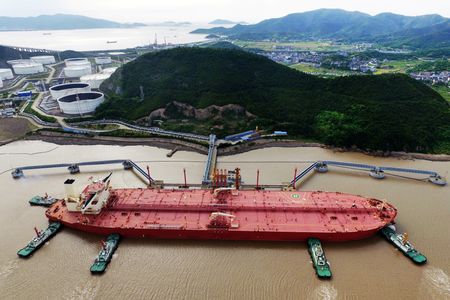By Helen Reid
LONDON (Reuters) – German sportswear brand Puma has reduced the amount of merchandise it ships to the United States from China to adapt its supply chain to tariffs, and could increase prices in the U.S., the chief financial officer said on Thursday.
Puma is in a transition period, having replaced its CEO last month after a string of profit warnings as the company struggled to drive consistent sales growth and ceded market share to rival Adidas.
It has appointed former Adidas sales chief Arthur Hoeld as CEO, who will take over on July 1.
Puma reported first-quarter sales of 2.08 billion euros ($2.35 billion), up 0.1% from the first quarter of last year, and slightly better than analysts’ average forecast of 2.04 billion euros.
It maintained its 2025 outlook, excluding any impact from U.S. tariffs, which helped drive shares 8% higher by 1020 GMT. The stock is still down 43% since the beginning of the year, however.
TARIFFS
Like competitors Adidas and Nike, Puma would be hit hard if U.S. President Donald Trump reinstates steep tariffs on Southeast Asia, currently paused until July.
The volume of Puma products destined for the U.S. market which are sourced from China has been cut to 10% and is decreasing further, Chief Financial Officer Markus Neubrand said.
Vietnam, Cambodia, and Indonesia are now the biggest sources for products sold in the United States.
With tariffs driving costs higher, Neubrand said Puma would watch for price hikes by rivals before increasing its own.
“We don’t want to be the leader in terms of the pricing change in the U.S. market,” he told reporters on a call.
Overall, Puma buys 28% of its products from factories in China, with Vietnam a close second at 26%, and Cambodia producing 16%.
Puma’s inventories at the end of the first quarter were up 21% from a year ago, as it delivered more goods to the U.S. ahead of tariffs taking effect.
Weaker sales to retailers in the U.S. and China drove wholesale business down 3.6% in the quarter, but stronger online sales helped its direct-to-consumer business grow 12% to 546.5 million euros.
Puma will have cut 500 corporate positions globally by the end of the second quarter as part of an ongoing cost-cutting drive.
($1=0.8846 euros)
(Reporting by Helen Reid; Editing by Rachna Uppal and Clarence Fernandez)










